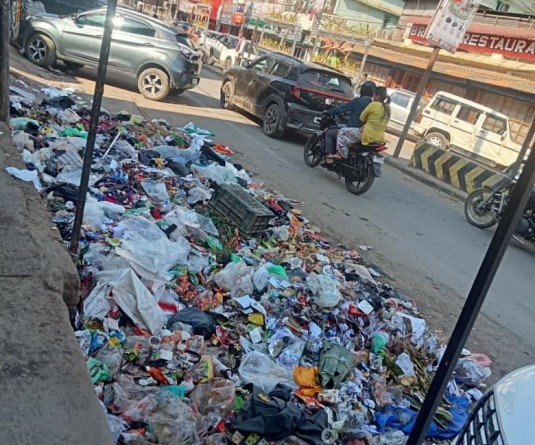Building climate resilience through women empowerment

Various kinds of seeds being displayed during the Nagaland women farmers convention as part of the celebration of International Day of Rural Women in Kohima on October 15 under the theme “Sustainable infrastructure and services for the empowerment of rural women and girls.” (Morung Photo)
Morung Express News
Dimapur | October 15
The role played by women in the rural economy largely goes unaccredited and unnoticed particularly in a patriarchal Naga society. Unfairly relegated to the role of doing chores regarded as petty by the men folks, a rural woman however contributes far greater. From household chores, fetching water, washing, caring for the children, farming, harvesting, earning and sometimes even as peacemakers, the unpaid efforts if quantified would certainly make a significant contribution to the GDP.
In India, about 70 percent of farm work is said to be performed by women, which further points to the crucial contribution of women to the economy.
As per the UN, this role in ensuring the sustainability of rural communities and overall wellbeing has been increasingly recognized as “women account for a substantial proportion of the agricultural labour force, including informal work, and perform the bulk of unpaid care and domestic work within families and households in rural areas.”
This is however becoming increasingly challenged by climate change. Erratic weather shifts are increasingly threatening to disturb this network, which calls for awareness and innovation to adapt to the changes.
With this in mind, year 2019’s International Day of Rural Women was observed under the theme — Rural women and girls building climate resilience – on October 15.
In Dimapur, the NGO Sisterhood Network organised a programme at the Tourist Lodge.
With statistics pointing to rural farmers feeling the pinch of climate change already, building “climate resilience” was at the core of the programme’s message.
A survey conducted by Sisterhood Network said that effects of climate change are affecting access to agricultural resources.
According to Eva Rongmei, FPAR Co-researcher of Sisterhood Network, the survey was conducted in 11 villages in Dimapur and Peren with a sample size of 384 individuals (184 women and 180 men). Rongmei said that the survey sample, though small, reveal a growing impact of climate change in the rural farm economy, particularly on women. It further pointed to awareness and access to support to alleviate or deal with the effects, she said.
“342 (men and women) of the respondents said climate change was affecting access to natural resources. 87 of the 184 women said they had never availed governmental or external aid, while the men have greater access to support schemes.”
Tiasenla N Jamir, IT Staff at the Sakhi One Stop Centre, Dimapur of the Union Ministry of Women and Child Development, shed light on the various women-oriented government schemes available and support against abuse.
In addition to schemes like the Janani Shishu Suraksha Karyakaram of the Ministry of Health & Family Welfare, Janani Suraksha Yojana (JSY) under the National Rural Health Mission, Beti Bachao Beti Padhao campaign and many others, Jamir said that the Sakhi One Stop Centre is another that can help women in distress. It runs a 24/7 toll free number 181 (for Nagaland).
Dr. Azeze Seyie, Horticulture Scientist, Indian Council of Agricultural Research (NEH Region), Jharnapani, said that climate change affecting rural women would have a cascading effect. According to her, 75 percent of the state population is engaged in agriculture in one form or the other of which 68 percent is concentrated in rural villages and almost two-third of the rural cultivation has been rice.
She said that farming is dependent on the monsoon and most farmlands and rice fields remain fallow during the dry season. Further, if the rains fail, the impact often is debilitating and magnified by erratic weather pattern, depleting water source and decreased production.
While encouraging innovative and intensive farming methods with land cultivated year round, she said, “Knowledge, seeking or approaching the right government agencies for skilling and support” could turn things around. As the machine that keeps afloat the rural economy, she said that women should take the lead and “be the change.”
ADCP (Crime) of the Dimapur police, Relo T Aye said that the police can aid secure women from societal harassments, which often go unreported. He said that women should not hesitate to lodge complaints, even indirectly through NGOs and government helplines.




.jpg)

